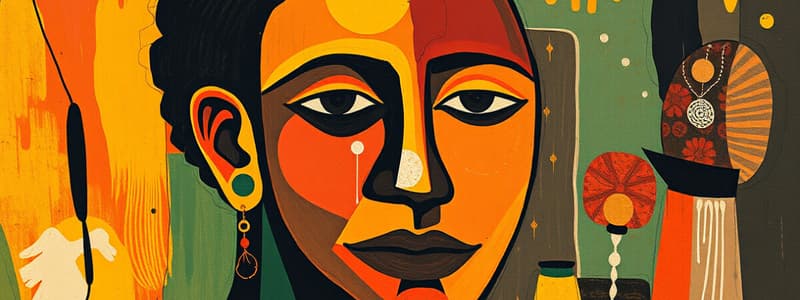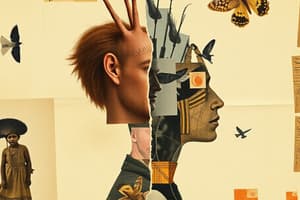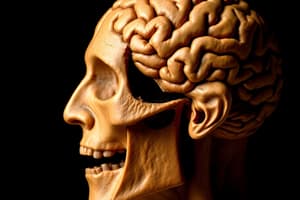Podcast
Questions and Answers
What does anthropology systematically study?
What does anthropology systematically study?
- Humanity (correct)
- Cultural processes only
- Biological processes only
- Social practices
What type of anthropology focuses on human biological evolution?
What type of anthropology focuses on human biological evolution?
Biological Anthropology
What is the term used for the construction of identity based on social characteristics?
What is the term used for the construction of identity based on social characteristics?
Social identity
Which of the following describes egocentric self?
Which of the following describes egocentric self?
Sociocentric self values independence over interdependence.
Sociocentric self values independence over interdependence.
The three phases of a rite of passage are separation, ______, and incorporation.
The three phases of a rite of passage are separation, ______, and incorporation.
What does Clifford Geertz redefine culture as?
What does Clifford Geertz redefine culture as?
What is the significance of personal naming in social identity?
What is the significance of personal naming in social identity?
According to Arnold van Gennep, what marks the change in one’s status during a rite of passage?
According to Arnold van Gennep, what marks the change in one’s status during a rite of passage?
What is the fundamental course described in GEC 101?
What is the fundamental course described in GEC 101?
Which of the following topics are covered in the course? (Select all that apply)
Which of the following topics are covered in the course? (Select all that apply)
The highest possible grade in the grading system is _____
The highest possible grade in the grading system is _____
Who is the instructor for the course?
Who is the instructor for the course?
Socrates believed that self-knowledge is necessary for a meaningful life.
Socrates believed that self-knowledge is necessary for a meaningful life.
What is the meaning of philosophy?
What is the meaning of philosophy?
Philosophers often engage in asking, _____, and arguing.
Philosophers often engage in asking, _____, and arguing.
What did Socrates argue regarding the aspects of personhood?
What did Socrates argue regarding the aspects of personhood?
Flashcards are hidden until you start studying
Study Notes
Anthropology Overview
- Anthropology systematically studies humanity, examining the interplay between cultural and biological processes in shaping human experience.
- The discipline employs a holistic and integrated approach to understand human nature.
- Key branches include Biological Anthropology (focusing on human evolutionary biology and physical adaptations) and Sociocultural Anthropology (interpreting cultures, social behaviors, and cultural change).
Concept of Self in Anthropology
- The self is defined holistically, integrating both biological and sociocultural factors.
- James Peacock advocates that anthropology bridges sciences and humanities, providing insights into the interconnectedness of cultural and biological aspects.
Cultural Constructs
- Edward Tyler defines culture as an integrated whole comprising knowledge, beliefs, arts, morals, laws, and customs acquired by members of society.
- Culture shapes behaviors and overlaps with shared experiences and societal values.
- Few anthropologists delve into the self; Martin Sokefeld argues for the necessity of the self concept to supplement cultural understanding.
Identity Perspectives
- Social anthropology often emphasizes ethnic identity, highlighting commonalities in language and culture.
- Peacock posits that individuals embody cultural molds but possess personal freedom, distinguishing them from uniformity.
Types of Self
- Egocentric Self: Seen in Western cultures (like the U.S. and Europe), emphasizes autonomy and assertiveness.
- Sociocentric Self: Predominant in Asian cultures, focuses on social context and interdependence, prioritizing harmony and authority.
Social Identity Components
- Social identity derives from individual characteristics (age, gender, socioeconomic status).
- Key identity determinants include:
- Family membership as a foundational identity feature.
- Language as a significant marker of group identity.
- Religious affiliation may also denote group identity.
- Personal naming symbolizes cultural self and legitimizes social/group membership.
Identity Development
- Arnold van Gennep outlines the three phases of rite of passage marking identity:
- Separation phase: Detachment from an old identity.
- Liminality phase: Transition between identities.
- Incorporation phase: Official recognition of a new identity.
Identity Struggles and Crises
- Discrepancies between self-identified and externally attributed identities can precipitate identity struggles, potentially leading to identity crises.
Clifford Geertz's Perspective
- Geertz redefines culture as a system of inherited conceptions and symbolic forms that facilitate communication and development of knowledge and attitudes.
- Emphasizes the necessity of culture for individuals to derive meaning from their experiences.
Course Overview
- Understanding the Self is a core course in General Education Curriculum (GEC) for tertiary education.
- Objectives include fostering critical and reflective attitudes towards personal identity and issues of self.
Course Structure
- The course is divided into three main components:
- The self from multiple perspectives
- Unpacking the self
- Managing and caring for the self
Proposed Asynchronous Sessions
- Schedule includes sessions on:
- September 22, 23, 26, 27
- October 24-28
- December 7-11
- January 9-13 (finals preparation)
- January 16-20 (submission of final requirements)
Grading System
- Exam(s): 20%
- Assignments and submissions (reflection papers, etc.): 40%
- Classroom activity performance: 30%
- Attendance: 10%
- Highest grade possible: 1.0
- Passing grade: 3.0
- Failing grade: 5.0
Key Philosophical Themes
- Central questions in the course include:
- Who am I?
- What is my real self?
- What constitutes my fundamental identity?
- The self is often perceived as intrinsic to one's existence, with a common boundary of the skin representing the personal identity.
Self-Exploration
- Self-discovery is a continuous process; individuals are encouraged to understand their true selves beyond societal labels or names.
- Reflection on behaviors that misalign with one’s true self is promoted.
Philosophy and Identity
- Philosophy is defined as the "love of wisdom," focusing on knowledge, reality, existence, and moral values.
- Philosophers challenge existing knowledge to uncover fundamental truths about self and existence.
Historical Context
- The Greeks laid the groundwork for philosophical inquiry into the self, posing questions about personal identity and its relationship to the physical body.
Socratic Insights
- Socrates is noted for his principle "Know thyself"; he emphasizes the importance of self-knowledge for a meaningful life.
- He introduces the notion of dualism, stating that each person comprises a body (imperfect, impermanent) and a soul (the eternal aspect of self).
Studying That Suits You
Use AI to generate personalized quizzes and flashcards to suit your learning preferences.





